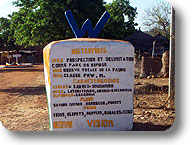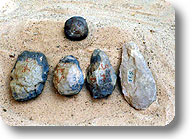



|
Within the international cooperation project between Parco Fluviale del Po e dell’Orba and Regional Park W Ecopas (Benin, Burkina Faso, Niger) called "The River and the Park: From Piedmont to Sahel", 3 Welcome Centers for Environmental Education are under construction in the Regional Park W / Ecopas.
The following people have participated in the project: Carmela Caiazzo, in charge of Settore fruizione e didattica (Parco Fluviale del Po e dell’Orba); Serge Sourou OGA, Administrative Assistant and Environmental Education Training Assistant (Park W Benin); Jean Bosco SO, in charge of the Ecology and Environmental Education Training Offices (Park W Burkina Faso); Abdoulaye Amadou Harouna, in charge of the Environmental Education Office (Park W Niger). The project includes several points and will be gradually carried out in the years to come. In particular, on the program there are the following actions:
- Building of infrastructures and supply of equipment
Supply of tents to welcome 50 persons (for the overnight stay and day activities of guides, pupils, and teachers); beds, blankets, insect screens, tables, dustbins; equipment for lighting; means of transport and driver (the latter to the account of the Ecopas program); equipment for the kitchen (pots, pans, ladles, dishes, glasses, and pieces of cutlery, gas bottle and stove, water cans, foodstuff). The tents and relative equipment will be provided until the buildings of the ECOPAS Program will be finished.
- Elaboration of educational programs dealing with the knowledge of the territory, environmental studies, and environmental education to suggest in the centers
The programs will focus on the promotion of the knowledge of the Park natural environment (water system, fauna, flora, geology, climate, human presence), the problems linked to the human pressure on the Park (poaching, sheep breeding, and transhumance), the main ecological concepts, and will try to develop the children's awareness towards a change leading to a more ecologically sustainable behavior. We will avoid to force certain behaviors, so that children can decide by themselves how to use the information they acquired and the experiences they lived during the environmental programs.
- Planning and implementation of itineraries, material, and educational workshops
Development of educational itineraries, elaboration of issues and identification of activities, elaboration of manuals for teachers and pupils, production of material for educational activities.
- Training of the Park guides and teachers
Selection of guides according to general knowledge, communication capacities, love for children and nature, willingness to become a guide, and spirit of sacrifice. The training of the guides and teachers will focus on issues like ecology and issues linked to the territory where they will work (history, architecture, fauna, etc.), knowledge of educational activities and of the project, communication and group management. In each welcome center, there will be small educational workshops provided with materials for projections, exhibit halls on the Park environments, small collections of documents on the Park territory to promote its knowledge, spaces dedicated to the production, exhibit, and sale of local handicrafts.
The first of these welcome centers was inaugurated the past 2nd June in the presence of important local authorities and a delegation from Parco Fluviale del Po. The Center is called "School Village of the Triple Point" and has been created in the heart of Park W, exactly in the point where the territories of the three States forming Park W, that is Benin, Niger, and Burkina Faso meet. The Village consists of a series of brickwork bungalows, large premises used as a kitchen, and several premises used as toilets, and can welcome about 60 students. Considering the interest demonstrated in this work, the partners of the Project have decided to enlarge the Village in the following months, also thanks to the commitment of Parco del Po and Regione Piemonte to the further building of bungalows (probably 4 or maybe more) and an equipped educational lab.
In a short time, two new educational programs and the relative itineraries that will be used in the School Village of the Triple Point will be elaborated and, at the same time, the training of the Guides of Park W will begin: a new and important opportunity for the survival and development of the local population.
|

